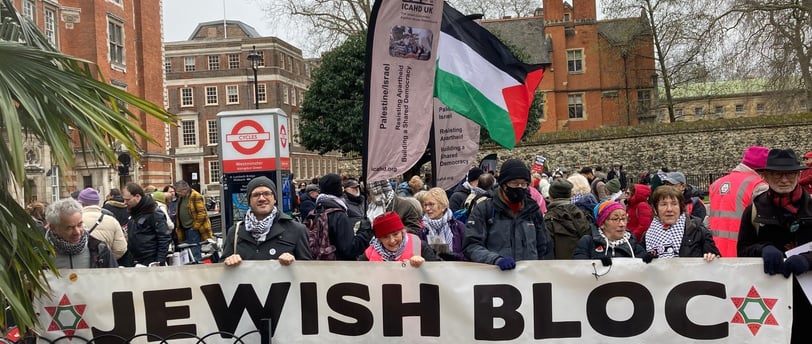Deepening Rift in British Jewish Community: Five Board Deputies Suspended for Criticizing Israel’s Gaza War
The UK’s Board of Deputies suspends five Jewish members for opposing Israel’s Gaza war, reflecting growing division within Britain’s Jewish community.
GLOBALNEWS
Refaat Ibrahim
6/25/20254 min read


In a move that reflects growing internal divisions over Israel’s war on Gaza, the executive body of the Board of Deputies of British Jews announced on Tuesday the suspension of five deputies for two years. The suspension came in response to their signing of a public letter that strongly criticized the Israeli government’s conduct during the ongoing military campaign in Gaza.
The board’s decision followed a two-month internal investigation, which concluded that all 36 signatories of the letter had violated the organization's code of conduct. While 31 deputies received formal warnings, five were suspended, with the possibility of reducing the suspension to six months if a written apology is issued to the “affected parties,” according to the board’s statement.
Public Letter Sparks Controversy: “Israel’s soul is being torn apart.”
The letter, published in The Financial Times in April, stated that remaining silent amid Israel’s actions in Gaza amounted to "implicit support for policies that conflict with our Jewish values." The signatories expressed solidarity with families of Israeli hostages still in Gaza and with “hundreds and thousands” of Israelis protesting their own government, labeling Prime Minister Netanyahu’s administration as "the most extreme in Israel’s history."
They accused the government of “openly encouraging violence against Palestinians in the West Bank, choking the Palestinian economy, and building new settlements at unprecedented levels.” The letter concluded, “We stand against this war. As Jews, it is our duty to speak out.”
Following Israel’s violation of a ceasefire agreement and resumption of hostilities in March, the signatories declared that “Israel’s soul is being torn apart,” adding, “We can no longer turn away or remain silent.”
Institutional Clash: Freedom of Expression vs. Reputation of the Board
Founded in 1760, the Board of Deputies of British Jews is the UK’s oldest representative body for Jewish communities. It has historically advocated strongly for Israel and issued multiple statements perceived as supportive of Israeli military operations since the war on Gaza began in October 2023.
However, a growing number of British Jews, especially from liberal, reform, and progressive denominations, reject the board’s claim to represent them, arguing that its stances do not reflect the diversity of opinion within the community.
One of the suspended deputies, Philip Goldenberg, sparked fierce internal debate when he told the BBC:
“Look, this war could have ended, and the hostages could have been freed. Netanyahu deliberately reignited it to attract some racist and extremist elements into his coalition to maintain power. It’s that simple.”
This statement, along with the letter, triggered multiple complaints from members of the United Synagogue, the largest Jewish denomination in the UK, prompting the board to launch its disciplinary review.
The Disciplinary Committee’s Verdict: A Breach of Conduct and Public Confusion
The board’s internal committee concluded that the letter caused “widespread misunderstanding among the media and stakeholders,” who interpreted it as an official statement from the board itself. The code of conduct, the committee noted, prohibits members from misrepresenting the board’s position or damaging its reputation.
Michael Wegier, Chief Executive of the Board of Deputies, stated:
“We are a democratic organization that values debate and freedom of expression. But managing diversity of opinion requires a framework that maintains clarity about our collective stance and preserves the institution’s dignity.”
He emphasized that while the board welcomes internal dissent, it expects its members to adhere to conduct that prevents public confusion or reputational harm.
A Divided Community: Dissent, Identity, and the Limits of Representation
According to a poll conducted last summer by the Jewish Policy Research Institute, an independent and respected think tank, 88% of British Jews said they did not support Prime Minister Benjamin Netanyahu. This figure reflects a widening disconnect between the official pro-Israel positions of legacy institutions like the board and the opinions of large segments of the community.
Most of the letter’s signatories belong to reformist or progressive Jewish denominations, and several have reportedly faced harassment and threats for speaking out. Critics say the board’s leadership leans too heavily on traditionalist views and fails to reflect the evolving identity of British Jewry.
Jewish Anti-War Activism: The Silenced Voices Inside the UK
For years, grassroots Jewish groups in the UK have organized against the occupation of Palestine and rejected identification with Israeli state policy. These voices are often sidelined by mainstream British media, despite their vocal presence in public protests and university movements.
Some of these groups include
Na’amod – British Jews Against Occupation
Jewish Network for Palestine
Jewish Voice for Labour
Jewish Socialists’ Group
Many members, including Holocaust survivors and their descendants, have taken part in recent university encampments across the UK in solidarity with Gaza, marking a generational shift in Jewish political expression.
These organizations argue that criticizing Israel is not antisemitism but rather an act of moral conscience rooted in Jewish ethics, centered on justice, dignity, and human rights.
Conclusion: Crisis of Representation or Democratic Awakening?
The suspension of five deputies by the Board of Deputies of British Jews is more than just a disciplinary action; it is emblematic of a deeper fracture in the identity and direction of British Jewry.
As war crimes investigations against Israel proceed at the International Court of Justice and as global outrage grows, internal dissent among Jews in the diaspora is no longer marginal. It’s part of a broader reckoning, challenging inherited structures, reimagining solidarity, and amplifying unheard voices.
Whether this moment becomes a turning point for democratic renewal or further silencing will depend on how the board and the wider community choose to confront dissent: as a threat or as an opportunity.
Awareness
Documenting reality, amplifying Palestinian voices, raising awareness.
Contact Us:
resistant.p.pens@gmail.com
Follow our social media
